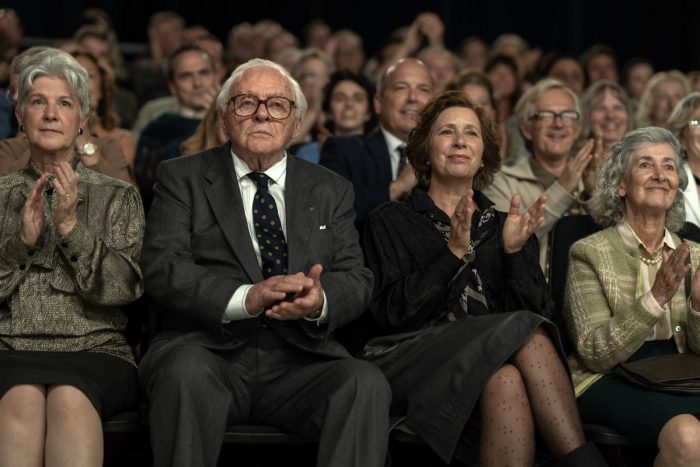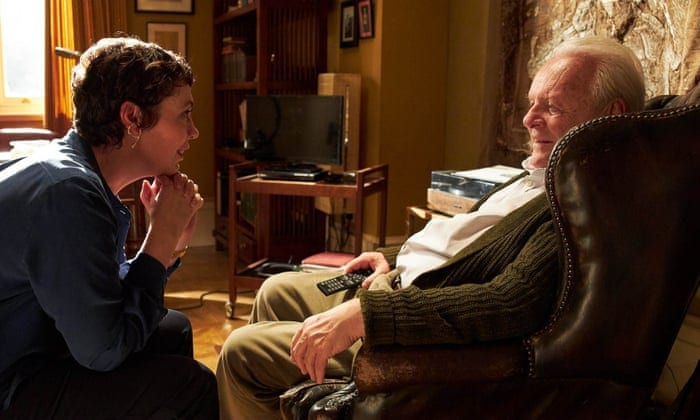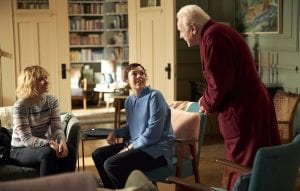Reviewed by Jeffrey Sanzel
Early in One Life, twenty-nine-year-old London stockbroker Nicholas Winton (Johnny Flynn) visits a makeshift camp in the center of Prague in 1938. Here, the mostly Jewish displaced families from Germany and Austria who fled the Nazi regime live in homeless squalor and starvation.
Encountering child after child, he produces a half-eaten chocolate bar, which he proceeds to divvy among the starving children. Of course, there is not enough. In this moment, director James Hawes brilliantly shows Winton’s tacit epiphany: he must rescue these young victims.
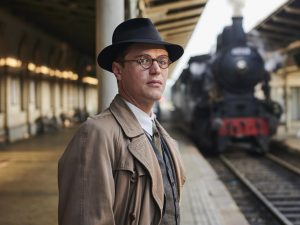
Over the next ninety minutes, the brisk, brutal, and beautiful film alternates between young Winton and the seventy-nine-year-old Winton (Anthony Hopkins) struggling with divesting remnants of his mammoth undertaking, symbolized by the briefcase given to him when he committed to helping the refugees’ plight. The briefcase is home to a scrapbook chronicling the entire undertaking.
While the film shifts in time, each section proceeds in a simple, linear fashion. The narrative is clear, with the story focusing on the action played out under the shadow of the encroaching Nazi invasion. Winton takes on the British government, negotiating immigration. Additionally, he finds hundreds of foster families. One Life makes paperwork and red tape a visceral issue of life and death. The scenes in Prague are vivid and harsh and truly haunting, calling to mind equally difficult images of current events.
Winton becomes an active member of the Prague office of the British Committee for Refugees from Czechoslovakia (BCRC), headed by the formidable Doreen Warriner (Romola Garai). Devastating scenes of parents sending their children away and of sibling separation contrast with the cold British offices.
Winton managed to get eight trains, with six hundred and sixty-nine children, from Czechoslovakia to London. The Nazi invasion of Poland stopped the ninth train, which contained three hundred and fifty children. Their fate, like so many, would be the Nazi death camps.
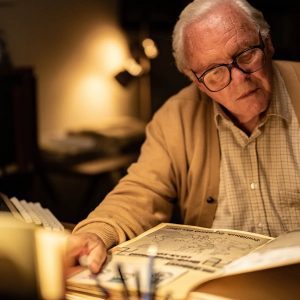
Photo courtesy of See-Saw Films
One Life is about faith in regular people, a tribute—as Winton declares of their coterie—to “an army of the ordinary.” Quiet but adamantly dogged in his pursuit of humanitarian aid, Winton is joined by his mother, Babi (Helena Bonham Carter). Babi is a Jewish-German immigrant who converted to the Church of England. Both sensitive and a voice of reason, she reminds Winton, “You cannot save them all. You must forgive yourself that.”
The 1988 section of the film shows Winton trying to decide what to do with the final remnants of these historical records. His internal struggle leads to his appearance on the crass but popular television show That’s Life. The recreation of his two appearances highlights the contemporary portion, allowing Winton to reconnect to the lives he saved. (The actual footage of the real Winton is available online and featured in the documentary The Power of Good: Nicholas Winton.)
Lucinda Coxon and Nick Drake thoughtfully crafted a tight, taut screenplay from daughter Barbara Winton’s account of her father, If It’s Not Impossible … The Life of Nicholas Winton. James Hawes’ powerful direction is matched by Zac Nicholson’s stark, desaturated cinematography and perfectly complemented by Lucia Zucchetti’s sharp editing.
The ensemble cast is uniformly strong. Hopkins, one of the greatest actors of our time, offers nuance, introspection, and pain, presented with subtlety and sensitivity. He is the rare actor that you can watch think. Flynn is his equal as his contemplative, anxious, younger self.
As Babi, the terrific Bonham Carter is a matriarchal force of nature, balancing raw honesty and wry humor. Garai brings depth and pain to the no-nonsense Warriner. As Winton’s wife, Grete, Lena Olin provides a luminous grounding, showing her deep love for the conflicted Winton. Jonathan Pryce is warm and knowing as Martin Blake, the older version of one of the BCRC members. Samuel Finzi’s scene as the Prague Rabbi Hertz presents a poignant meditation on complicated fears in the Czech Jewish community.
But the performances that resonate above all are the children who play the refugees: they transcend the screen to create a heartbreaking reality.
According to the film, twenty-six thousand Jewish Czechoslovakian children were interred in concentration camps. Fewer than two hundred and fifty survived. Sir Nicholas Winton died at age one hundred and six, a man who never wanted the work to be about him. His legacy is some six thousand descendants because of the rescue mission. One Life is a genuine, gut-wrenching, but ultimately uplifting account of the ability of one person to make a difference.
Rated PG, the film is now playing in local theaters.

